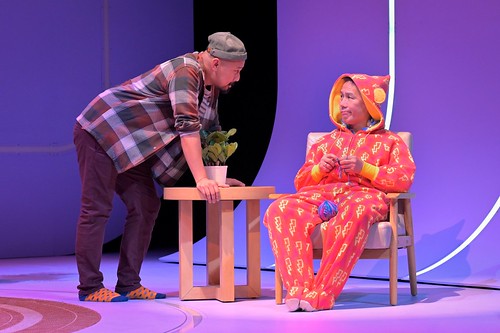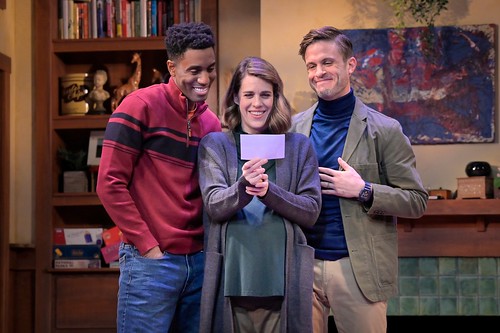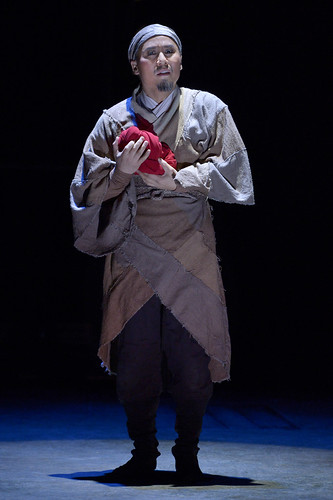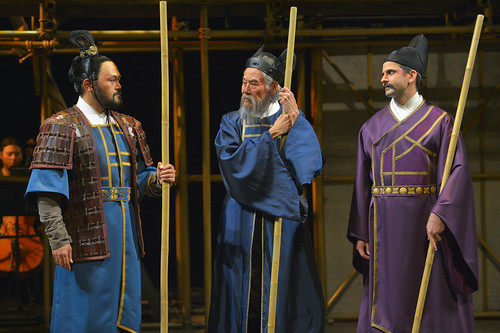
ABOVE: Jomar Tagatac (left) is Max and BD Wong is M in the world premiere of Kate Attwell’s Big Data, now at American Conservatory Theater’s Toni Rembe Theater through March 10. BELOW: (from left) Gabriel Brown is Sam, Rosie Hallett is Lucy and Michael Phillis is Timmy. Photos by Kevin Berne
For the first act of Kate Attwell’s world premiere Big Data at American Conservatory Theater’s Toni Rembe Theater, we are in a slick, stylized vision of modern life, and though it’s pretty, it isn’t pretty (if you know what I mean).
The back wall of the stage (scenic design by Tanya Orellana and projections by Kaitlyn Pietras and Jason H. Thompson) looks like a smart phone on its side. Sometimes the giant screen is filled with live video of what’s happening on (or under) the stage. Other times, it’s a hallucinatory montage of birds and code and the chaos of lfie in motion.
In this sleek, antiseptic world, we meet two couples, both of whom are visited by a curious character who becomes more and more familiar, even if we never really know who he is. Max (Jomar Tagatac) and Lucy (Rosie Hallett) are in different places in their lives but are both facing down dissatisfaction and frustration. An erstwhile journalist, he stays home and berates himself for being a loser, while she, a successful ophthalmologist, wants more than confines of her current clinic situation.
Enter M, an enigmatic character played with great charm and a hint of enigmatic menace by BD Wong. Max meets him first and, after some hesitation that approaches alarm, becomes quite enamored of this oddball in a plaid suit (costumes by Lydia Tanji) who seems to know so much about Max, offering comfort, insight, distraction and the hope of something better in his life.
Later, after an odd interview between M and Lucy about a possible new job, it becomes clearer what M represents when he asks familiar security questions like “name of first pet” and “name of street you grew up on.”
For all his cleverness and charisma, M is the embodiment of why the Internet has taken over the world. He’s the companion, the disguise, the algorithm that eavesdrops on our conversations (written and spoken) and makes just the right ad pop up in our feeds. He’s ubiquitous surveillance and reassurance, connector and consumer of time, numbing brain killer and thrilling dopamine pusher.
M also finds his way into the life of Lucy’s brother, Sam (Gabriel Brown), and Sam’s husband, Timmy (Michael Phillis). At first, he’s an app that connects the couple to an interested third, and that whole interaction opens up a whole passel of relationship/communication issues that are being mostly ignored because their lives are so filled with work and busy-ness.
There’s no question as to M’s motives of capitalistic exploitation of technology for world domination (after all, life is meaningless if you can’t scale up or take advantage of every juicy cyber morsel of user data). He begins the play with a prologue about pigeons and behavioral modification based on torture and reward to get them to do exactly what you want. Even before we know fully what the play will be, we know we are the addled pigeons.
Playwright Atwell and director Pam MacKinnon take the play in an entirely different direction in Act 2 when the action shifts to the remote country home of Sam and Lucy’s parents. Gone are the screens and clean surfaces of Act 1, replaced with a comfortable Craftsman-style home filled with many years of love and life. Didi (Julia McNeal) and Joe (Harold Surratt) are going through something significant, and they gather their children (and their partners) to share what’s going on. They, too, are responding to the omnipresence of technology abuse in every corpuscle of modern life, but their way of taking a stand and saying as forceful a NO as they can comes as quite a shock to their family.
At 2 ½ hours long, Big Data is never less than compelling (which is saying something for our dwindling, screen-size attention spans), even when it feels hectoring. We’re all complicit in all the issues addressed in the play, and we all likely know that our technology habits are not good for us, not good for relationships, not good for civilization. Attwell is too smart to be preachy – she opts for humor and heart and gets a huge assist from this wonderful cast.
It’s hard to imagine anyone more appealingly effective as the downfall of mankind than Wong is as M. Maybe he’s a savior, maybe he’s just committed to doing a good job, but he’s sweet and sly and full of irresistible magnetism.
The rest of the cast are more recognizable in their human foibles, and though they are familiar, Attwell is careful to give them quirks and complications and endearing traits that make us care about their lives. When things get really complicated, we’re right there with them trying to make sense of what could be utter craziness or absolute sanity.
If the ending isn’t quite the coalescence you might hope for, there’s no shortage of thought-provoking issues, ideas and performances here. Big Data uploads enough to keep our heads spinning for days.
FOR MORE INFORMATION
Kate Attwell’s Big Data continues through March 10 at ACT’s Toni Rembe Theater, 145 Geary St., San Francisco. Running time is 2 hours and 30 minutes (including intermission). Tickets are $25-$130 (subject to change). Call 415-749-2228 or visit act-sf.org.



